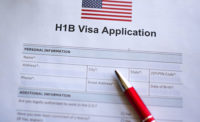The Trump administration has rescinded a July 6 directive that would have required international students attending universities in the U.S. to leave the country, if they did not attend in-person classes this fall.
The decision was announced July 14 in by U.S District Court Judge Allison Burroughs during a hearing in a lawsuit brought against the administration by the Massachusetts Institute of Technology and Harvard University.
As written in the rule, international students on F-1 visas would not be allowed to take a full semester of online-only classes this fall. If a student was scheduled to attend a university that did not offer in-person classes, that student would have to transfer to a different school or face deportation.
Hundreds of thousands of F-1 visas are issued annually, meaning that thousands could have lost their visas under the Trump administration rule, including many enrolled in engineering and construction degree programs. The administration faced harsh backlash from hundreds of universities and multiple federal lawsuit.
Also many schools still are struggling with delivery methods for fall instruction with still changing COVID-19 requirements across the country.
“The decision by Homeland Security to rescind its mean-spirited and completely misguided effort to force international students to leave the US if their institution determines it best to go fully online for public health concerns is more than a welcomed surprise,” said Willis Wang, vice president and associate provost for global programs at Boston University, one of more than 200 schools that filed lawsuit-supporting briefs.
Sheryl Sorby, current president of the American Society of Engineering Education, said in a statement after the July 6 order that she was "very concerned" that the changes would have had "a far-reaching, negative impact on American higher education, particularly in engineering and engineering technology, for many years."
Sorby, professor of STEM Education at Ohio State University, a recent Fulbright Scholar and former associate dean for academic programs in engineering at Michigan Tech University, added that "engineering innovation is an important driver of growth in the knowledge-based economy of the United States; the unintended consequences of this policy change" would have impeded "our ability to recover from the economic hardship caused by the pandemic."
Sorby emphasized that "at a time when engineering talent is more critical than ever to our recovery, now is not the time to be driving talent from our shores."
Twenty colleges and universities in western states also had joined in a separate federal lawsuit against the directive this month.
“We are seeking the federal government’s support and flexibility as colleges and universities work to provide for both the health and the academic goals of our students amid the unprecedented circumstances that have been brought about by the pandemic,” Stanford President Marc Tessier-Lavigne said in a July 13 statement, announcing that Stanford had joined the lawsuit.
Prior to the July 6 directive, schools had been directed by U.S. Immigration and Customs Enforcement that limits on online classes would be suspended “for the duration of the emergency.”



